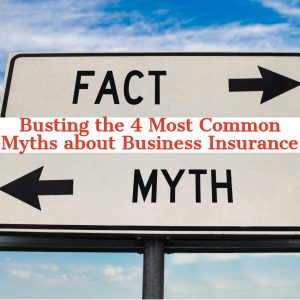Being the boss means you get perks like getting to do something you are passionate about on a daily basis. And make a living from it. What perk is better than loving going into work every day! But it also comes with a lot of responsibility. You’re responsible for your entire company. And there are plenty of risks in the business world no matter how small your business is. The best way to protect your company is with business insurance.
We can already see you rolling your eyes. There are so many stereotypes about business insurance it’s hard to know what to believe. We’re busting some of the most common myths to help you sort through all the misinformation. So you can start to look for the coverage that’s right for your business.
1.General Liability Covers Everything
As easy as it would be if this were true, it’s actually false. General liability coverage (GLC) is pretty comprehensive. But it still has limitations. Every business is different. And every business should have a policy built around its unique needs.
So, what does GLC cover? General liability covers things that fall into the following three categories:
- Bodily injury and property damage – GLC will cover bodily injury or damage to property caused by you or your employees.
- Medical expenses – Additionally, it will pay for any medical costs for anyone hurt on your property. And any injuries brought on by business operations offsite.
- Personal and advertising injury -You will be covered for any libel or slander claims, as well as in case of a copyright infringement claim.
It’s very important to know what a general liability policy will cover. But it’s just as important to know what it won’t cover. Here are the more common exclusions, just to give you an idea of what your GLC may be missing:
- Operation limitations – Policies for high-hazard businesses will have limitations. These limitations might deny coverage for some problems that arise from specific operations. Be sure to check your policy to make sure all of your business operations are covered.
- Contractor and subcontractor exclusion – This means any work done by contractors you hire will not be covered. If your business is heavily based in construction, you will want to watch out for this.
- Expected or intended injury – Any injury or property damage that is found to be intentional will not be covered by GLC.
- First party damage – Any injury or property damage to yourself or your belongings would generally not be covered by GLC.
- Product recalls – With this exclusion, any problems or costs that come with recalls to products you sell or use would not be covered.
While GLC covers the basics, the list of exclusions can go on and on. Every policy will have different exclusions. It’s best to check your policy to see what else your specific business might need.
2. My Home Insurance Covers My Home-Based Business
What if your workplace is in your home? Will your home insurance cover your business? Unfortunately, no. Even though your homeowner’s insurance covers your home and its contents, your business is separate. And your policy will not cover any losses associated with your business. But don’t worry, there are a few insurance options that can help:
- Business property insurance – This covers damage to any equipment in your home that you use for your business. That includes computers, printers, furniture, appliances, etc.

There are plenty of commercial insurance options for a home-based business. - Liability insurance – If your business requires anyone coming into your home, this will cover any injuries or property damage.
- Professional liability – This insurance is something most professionals need no matter where they work. It safeguards you from possible negligence or failure to meet standards.
- Product liability – This coverage will protect you from any damage caused by products you make, sell, or supply to clients.
If your home is your storefront, you’ll need to protect it just like any other brick and mortar business.
3. I Don’t Need Commercial Auto Insurance
If you don’t own a company vehicle, you might think that you don’t need commercial vehicle insurance. That is not entirely true. Just like your homeowner’s insurance, your auto insurance will only cover your car for personal use. For example, getting to and from work. If you get into an accident while working your personal auto insurance will not cover you.
You might need commercial auto insurance if you transport products or visit clients and worksites. You might even need coverage if you send or receive packages at the post office. These policies usually include:
- Coverage for medical bills – No-fault or personal injury protection will cover the medical expenses of anyone injured in a car accident regardless of fault.
- Uninsured motorist coverage – If you are hit by someone who doesn’t have insurance, or are a victim of a hit-and-run, this will cover any damages from the accident.
- Comprehensive and collision coverage – This will cover any theft, vandalism, flood damage, or damage from an object hitting your car.
Even though your company doesn’t own your personal vehicle it still needs commercial insurance. During off hours your personal auto insurance will have your back. But during business hours you need commercial insurance to fill in the gaps.
4. Business Insurance Is Too Expensive
It’s tempting to try and find ways to save money for your business, but if you cut the wrong costs you could end up losing the money you were trying to save and then some. If you don’t cover your business properly, you open yourself up to any number of financial risks. And business insurance isn’t as big of an expense as you might think. Especially considering the money it could save you.
Let’s look at the average costs of some of the types of coverage we’ve talked about:
- General liability – Around $88 a month
- Business property insurance – Around $65 a month
- Professional liability – Around $97 a month
- Product liability – Around $100 a month
- Commercial auto insurance – Around $167 a month
While those amounts do add up, and prices can differ depending on the risk and the size of your business. It’s still probably less scary than what you imagined. Now imagine you get sued and you don’t have coverage? Legal services can cost between $100-$300 an hour depending on the case. That doesn’t include what you might have to pay if you don’t win.
The Takeaway
The you pay price to insure your business is much less than what you’d pay without it. Having the right business insurance will give you peace of mind. Your insurance company will handle the legal worries while you focus on your business. You protect every other part of your life with insurance, so your business – your livelihood – should be no different. If you need help deciding what insurance best fits your business we’re here to help! EZ.Insure will help you tailor your insurance to you, so come to us for your free quote today. To get started, simply enter your zip code in the bar above, or speak to an agent directly by calling 888-615-4893.
Co-written by Brianna Hartnett